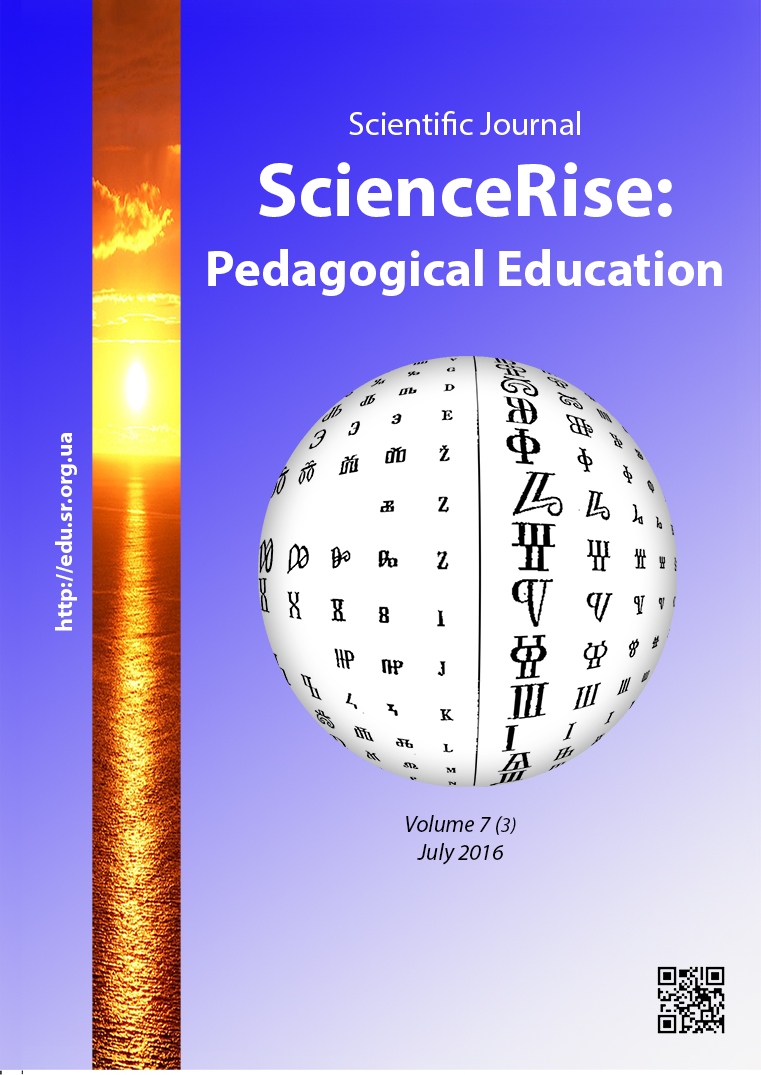Управління професійною підготовкою фахівців в умовах університетського коледжу: теоретичний аспект
DOI:
https://doi.org/10.15587/2519-4984.2016.74526Ключові слова:
управління, середовищний підхід, середовищний підхід до управління професійною підготовкоюАнотація
Досліджено теоретичні основи управління підготовкою фахівців в умовах вищого навчального закладу на засадах середовищного підходу. Встановлено, що середовищний підхід, завдяки своїм сутнісним особливостям, забезпечує опосередковане, через проектування освітнього середовища, управління становленням особистості у процесі здобуття фахової освіти, забезпечуючи умови для набуття фахової компетентності, загальнокультурного та особистісного розвитку
Посилання
- Nussbaum, M.; Smirnov, A. (Ed.) (2014). Ne radi pribyli: zachem demokratii nuzhny gumanitarnye nauki. Moscow: Izd. dom Vysshej shkoly jekonomiki, 192.
- Artjuhina, A. I. (2006). Obrazovatel'naja sreda vysshego uchebnogo zavedenija kak pedagogicheskij fenomen. Volgograd: Izd-vo VolGMU, 237.
- Vasil'eva, E. Ju. (2011). Obrazovatel'naja sreda vuza kak ob’ekt upravlenija i ocenki. Universitetskoe obrazovanie: praktika i analiz, 4 (74), 76–82.
- Kozyrev, V. A. (1999). Postroenie Modeli gumanitarnoj obrazovatel'noj sredy. Pedagog, 7. Available at: http://www.uni-altai.ru/Journal/pedagog/pedagog_7/a06.html
- Manujlov, Ju. S. (1997). Sredovoj podhod v vospitanii. Moscow, 192.
- Novikov, V. N. (2012). Obrazovatel'naja sreda vuza kak professional'no i lichnostno stimulirujushhij factor. Jelektronnyj zhurnal «Psihologicheskaja nauka i obrazovanie», 1. Available at: http://psyedu.ru/journal/2012/1/2776.phtml
- Sergejeva, L. M. (2015). Instytucijne osvitnje seredovyshhe profesijnogo navchal'nogo zakladu. Pedagogichnyj al'manah, 25, 112–117.
- Jaroshyns'ka, O. O. (2013). Kategorija "seredovyshhe" ta mizhdyscyplinarnyh pidhid u predstavlenni modelej seredovyshha. Problemy suchasnoi' pedagogichnoi' osvity. Pedagogika i psyhologija, 40 (2), 39–44.
- Abualrub, I., Karseth, B., Stensaker, B. (2013). The various s understandings of learning environment in higher education and its quality implications. Quali ty in Higher Education, 19 (1), 90–110. doi: 10.1080/13538322.2013.772464
- Salmi, J. (2009). The Challenge of Establishing World Class Universities. New York: World Bank. doi: 10.1596/978-0-8213-7865-6
- Hiemstra, R. (1991). Aspects of effective learning environments. Directions for Adult and Continuing Education, 1991 (50), 5–12. doi: 10.1002/ace.36719915003
- Lizzio, A., Wilson, K., Simons, R. (2002). University students’ perceptions of the learning environment and academic outcomes: implications for theory and practice. Studies in Higher Education, 27 (1), 27–52. doi: 10.1080/03075070120099359
- Kirschner, P., Van Vilsteren, P., Hummel, H., Wigman, M. (1997). The design of a study environment for acquiring academic and professional competence. Studies in Higher Education, 22 (2), 151–171. doi: 10.1080/03075079712331381014
- Borova, T. M. (2012). Teoretychni i metodychni zasady adaptyvnogo upravlinnja profesijnym rozvytkom naukovo-pedagogichnyh pracivnykiv vyshhogo navchal'nogo zakladu. Kyiv, 40.
- Galus, O. M. (2009). Pedagogichne upravlinnja adaptacijeju majbutnih uchyteliv u systemi stupenevoi' osvity. Kyiv, 44.
- Drach, I. I. (2013). Teoretychni i metodychni zasady upravlinnja formuvannjam profesijnoi' kompetentnosti magistrantiv pedagogiky vyshhoi' shkoly. Kyiv, 39.
- Petrychenko, L. O. (2014). Teoretyko-metodologichni zasady upravlinnja jakistju osvity u vyshhomu pedagogichnomu navchal'nomu zakladi. Lugansk, 37.
- Harkivs'ka, A. A. (2012). Teoretychni i metodychni zasady upravlinnja innovacijnym rozvytkom vyshhogo navchal'nogo pedagogichnogo zakladu. Lugansk, 40.
- Kun'kova, N. G. (2010). Poisk novyh podhodov k sovershenstvovaniju sistemy upravlenija kolledzhem. Nauchnye issledovanija v obrazovanii, 3, 20–22.
- Bronfenbrenner, U. (1993–1994). Ecological models of human development. In international Encyclopedia of education. Vol. 3. NY.: Freeman, 37–43. Available at: http://www.columbia.edu/cu/psychology/courses/3615/Readings/BronfenbrennerModelofDevelopment%28short%20version%29.pdf
- Velykyj tlumachnyj slovnyk suchasnoi' ukrai'ns'koi' movy (2005). Kyiv: «Prosvita», 1332.
- Horuzhaja, L. L. (2013). Osobenosti realizacii jetiko-pedagogicheskogo podhoda v professional'nom obrazovanii. Pedagogika, 12, 14–21.
- Petrov, A. (2005). Osnovnye koncepty kompetentnostnogo podhoda kak metodologicheskoj kategorii. Vestnik vysshej shkoly, 2, 54–58.
- Selivanova, N. L., Stepanov, P. V., Shakurova, M. V. (2014). Nauchnaja shkola L. I. Novikovoj: osnovnye idei i perspektivy razvitija. Otechestvennaja i zarubezhnaja pedagogika, 1 (16), 37–45. Available at: http://cyberleninka.ru/article/n/nauchnaya-shkola-l-i-novikovoy-osnovnye-idei-i-perspektivy-razvitiya
- Glazychev, V. L.; Gusejnov, A. A., Tolstyh, V. I. (Eds.) (1991). Duh mesta // Osvobozhdenie duha. Moscow: Politizdat, 138–167.
- Bratko, M. V.; Radul, V. V., Kushnir, V. A. et. al. (Eds.) (2015). Struktura osvitn'ogo seredovyshha vyshhogo navchal'nogo zakladu. Naukovi zapysky, 135, 67–72.
- Vishnjakova-Vishneveckaja, A. K. (2010). Obrazovatel'naja sreda vysshego uchebnogo zavedenija kak faktor razvitija lichnostnyh kompetencij uchashhihsja. Sankt-Peteburg, 27.
- Dewey, J. (1938). Experience & Education. New York: Kappa Delta Pi.
- D’jui', D. (2003). Dosvid i osvita. Lviv: Kal'varija, 84.
- Bratko, M. V.; Sysojeva, S. O. (Ed.) (2015). Osvitnje seredovyshhe vyshhogo navchal'nogo zakladu: funkcional'nyj aspekt. Pedagogichnyj proces: teorija i praktyka. Kyi'v: Vydavnyctvo VP «Edel'vejs», 1-2, 11–17.
- Borovskaja, E. V. (2014). Sistema obnovlenija sovremennogo obrazovanija na osnove sredovogo podhoda. Sistemnye obnovlenija sovremennogo obrazovanija: Mif ili real'nost'? Orenburg.
- Sergejeva, L. M., Kyrychenko, M. O. (2016). Managing organizational and educational changes in vocational institutional environment. ScienceRise, 1/5 (18), 27–32. doi: 10.15587/2313-8416.2016.59152
- Kremen', V. G., Pazynich, S. M., Ponomar'ov, O. S. (2007). Filosofija upravlinnja. Kyiv: Znannja Ukrai'ny, 360.
- Alekseeva, M. (1997). Planirovanie dejatel'nosti firmy. Moscow: Finansy i statistika, 248.
- Akoff, R. L. (2002). Akoff o menedzhmente. Serija: Teorija i praktika menedzhmenta. Sankt-Peterburg: Piter, 448.
##submission.downloads##
Опубліковано
Як цитувати
Номер
Розділ
Ліцензія
Авторське право (c) 2016 Василівна Братко Марія

Ця робота ліцензується відповідно до Creative Commons Attribution 4.0 International License.
Наше видання використовує положення про авторські права Creative Commons CC BY для журналів відкритого доступу.
Автори, які публікуються у цьому журналі, погоджуються з наступними умовами:
1. Автори залишають за собою право на авторство своєї роботи та передають журналу право першої публікації цієї роботи на умовах ліцензії Creative Commons CC BY, котра дозволяє іншим особам вільно розповсюджувати опубліковану роботу з обов'язковим посиланням на авторів оригінальної роботи та першу публікацію роботи у цьому журналі.
2. Автори мають право укладати самостійні додаткові угоди щодо неексклюзивного розповсюдження роботи у тому вигляді, в якому вона була опублікована цим журналом (наприклад, розміщувати роботу в електронному сховищі установи або публікувати у складі монографії), за умови збереження посилання на першу публікацію роботи у цьому журналі.








